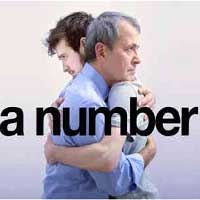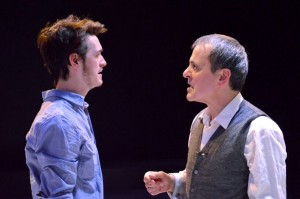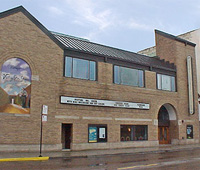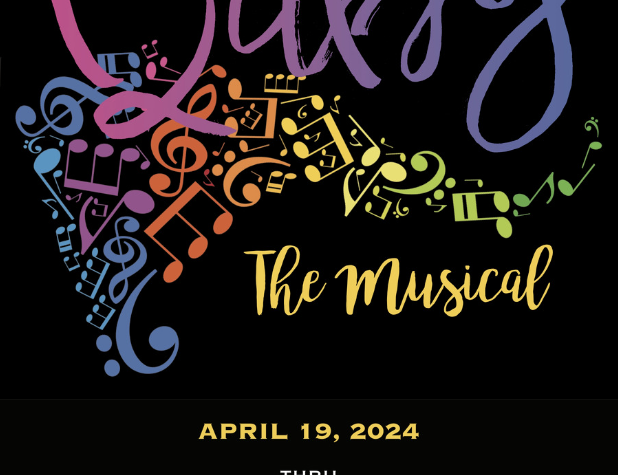
[rating=4]
 Caryll Churchill’s A Number can be a confusing play. The premise is that a son, Bernard (Owen Hickle Edwards), confronts his father (Stephen Fedo) over the fact that he has just seen someone identical to him on the street, leading to the secret that he was intended as a single clone from an earlier child that his mother given birth to. At first relieved to find out that he is his father’s son, he becomes more and more agitated as the provenance of his existence is revealed, and goes off never to return, engaging in a murder, and meeting, an appropriately hereditary family end. This sends his father, Salter, into an intense grief, and he goes to look oneof the numerous other copies of his son that were illicitly made without his knowledge or consent, ultimately finding the math teacher Michael Black (Owen Hickle Edwards) from whom he hopes to somehow fill the incredible amount of loss in his life by finding out something personal that is either unique to black, or more likely, something that Black shares with his own lost sons.
Caryll Churchill’s A Number can be a confusing play. The premise is that a son, Bernard (Owen Hickle Edwards), confronts his father (Stephen Fedo) over the fact that he has just seen someone identical to him on the street, leading to the secret that he was intended as a single clone from an earlier child that his mother given birth to. At first relieved to find out that he is his father’s son, he becomes more and more agitated as the provenance of his existence is revealed, and goes off never to return, engaging in a murder, and meeting, an appropriately hereditary family end. This sends his father, Salter, into an intense grief, and he goes to look oneof the numerous other copies of his son that were illicitly made without his knowledge or consent, ultimately finding the math teacher Michael Black (Owen Hickle Edwards) from whom he hopes to somehow fill the incredible amount of loss in his life by finding out something personal that is either unique to black, or more likely, something that Black shares with his own lost sons.
Though widely considered a play about the ethics of cloning, I didn’t feel the script weighed one side of the ethics of human cloning against another, let alone come down with in an opinion in favor or against. For me, it was a thoroughly emotional and situational tragedy which the director Domenica Cameron-Scorcsese seemed to understand and run with Armed with nothing but a chair and a white backdrop for sets and properties (Technical Coordinatior: Michael Rathbun), Cameron-Scorsese took us through scenes of increasing emotion while drawing performances from her actors that were marked by their intense feeling and consummate realism. While at first I was a little distracted by exactly how much Hickle Edwards looked like Danielle Radcliffe, especially as Scorsese chose to do the play in American accents (which could be awkward as the word-choice, description of time and place, and characters felt so British), I soon became impressed both by his skill, nuance, the intensity of his performance(s) and chemistry with Fedo off whose performance he demonstrated incredible skill. 
In Fedo’s hand’s, Salter has a natural sadness and weariness about him that you would expect from a man who had faced considerable personal tragedy which incrementally increases as he realizes that has failed to avert more. However, that demeanor may simply have been giftedly affected as he maintained an incredible degree of consistency throughout his part, and while it sounds pretentious to say it, a single one of his incredibly apt gestures alone could be emotionally devastating so all one could feel for Salter was sadness and sympathy rather than condemnation, even when he, at least initially, engages in some rather unsavory behavior, suggesting that he had son file suit for money rather than come clean about his responsibility for and the provenance of Bernard’s situation.
Such skills are balanced incredibly against Hickle Edwards performance who plays Bernard 1, Bernard 2, and Michael Black. (Although, while I was not entirely sure, I thought that we were dealing only with Bernard 2 and Michael Black for the entire play—as I said: the script could be confusing.) His equally realistic acting style demonstrates a contrasting youthful passion and intelligently conveys someone still struggling to become an individual (thematically central to the play), and ultimately goes to incredibly horrific lengths to achieve that goal, failing nonetheless. Hickle Edwards also produces the slightest alterations between Bernard and Michael Black, making sure that while he is in some ways they are the same entity and inclined to similar countenance and mannerisms, he gives off a sense of his different in his situation in life and attitude towards his provenance—accomplished partly through slightly different gestures but a voice and delivery that feels exactly the same.
All in all, this is the best I have seen of Churchill’s play’s and I was thrilled that it was so well directed and superbly acted. Though it did not provoke thoughts, at least about the ethics of cloning, it nevertheless registered a devastating emotional impact, almost exclusively through the actor’s respectively melancholic and charged performances, that stayed with me long after the play. Even its highly minimalist set was effective: giving the play an intentionally futuristic sense (as described in the script) and allowing us to take in the actor’s breathless performances. Cameron-Scorsese even made considerable dramatic use of the play’s single prop: a chair which increased play’s intensity although the actor’s skill alone would probably have been enough to make this play a success.
Runcible Theatre Company’s production of “A Number” runs through May 8, 2016 at the Royal George Theatre, located at 1641 N. Halsted Street in Chicago.
Performances are Thursday 8 p.m.
Saturday 8 p.m.
Sunday 3 p.m.
Tickets are 26 dollars and can be purchased in person at the Royal George Box Office, which opens at noon on days on which there are performances; by calling 312-988-9000; or visiting www.ticketmaster.com . Limited discounted tickets may be available at the box-office or by visiting Goldstar or Hottix
There is valet parking at the theater as well as neighborhood street parking and the Steppenwolf garage directly across the street.
To see what others are saying, visit www.theatreinchicago.com, go to Review Round-Up and click at “A Number”
.







More Stories
“How to Know the Wild Flowers: A Map” reviewed by Julia W. Rath
“Baby: the Musical”
“Nana” reviewed by Jacob Davis